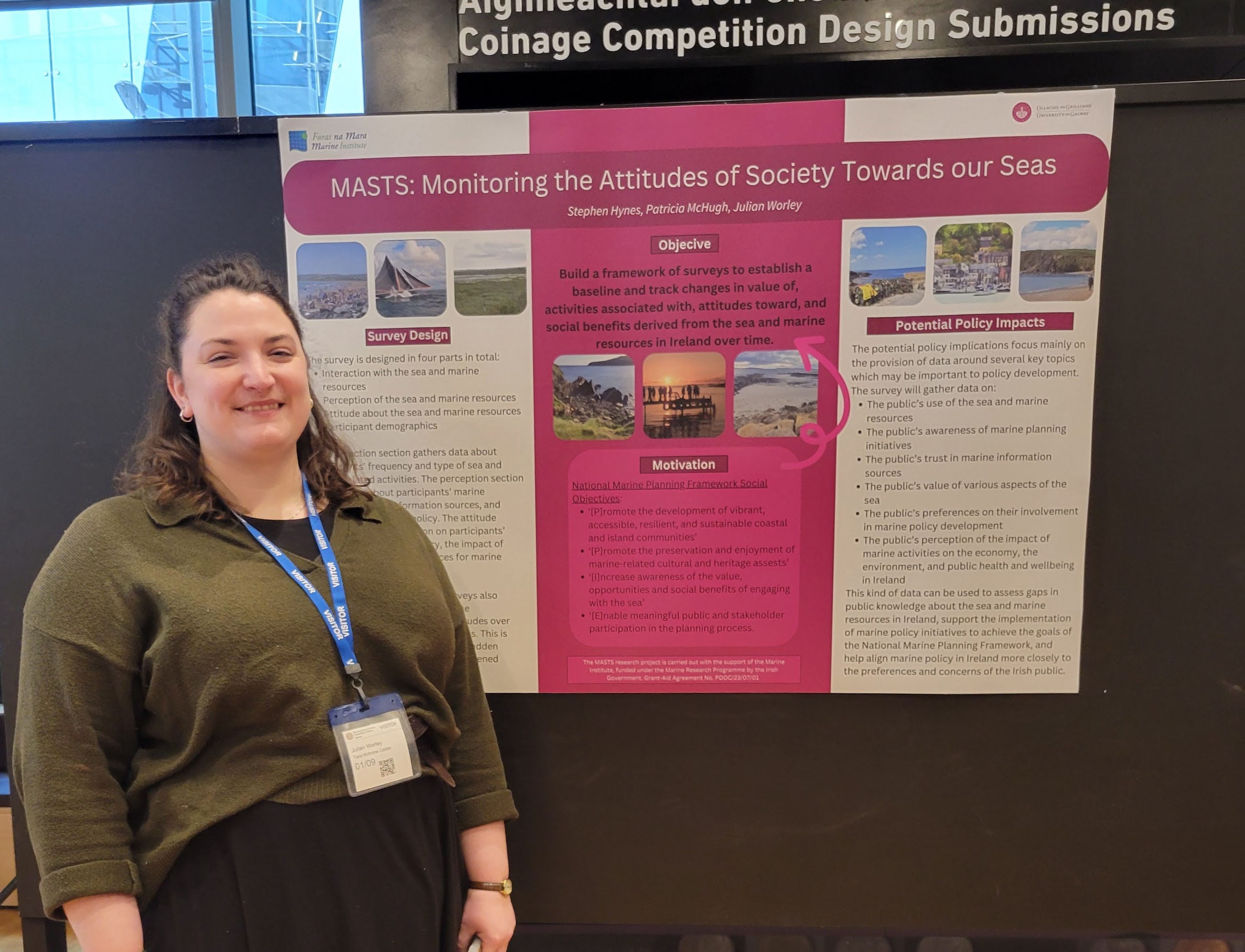-
Courses

Courses
Choosing a course is one of the most important decisions you'll ever make! View our courses and see what our students and lecturers have to say about the courses you are interested in at the links below.
-
University Life

University Life
Each year more than 4,000 choose University of Galway as their University of choice. Find out what life at University of Galway is all about here.
-
About University of Galway

About University of Galway
Since 1845, University of Galway has been sharing the highest quality teaching and research with Ireland and the world. Find out what makes our University so special – from our distinguished history to the latest news and campus developments.
-
Colleges & Schools

Colleges & Schools
University of Galway has earned international recognition as a research-led university with a commitment to top quality teaching across a range of key areas of expertise.
-
Research & Innovation

Research & Innovation
University of Galway’s vibrant research community take on some of the most pressing challenges of our times.
-
Business & Industry

Guiding Breakthrough Research at University of Galway
We explore and facilitate commercial opportunities for the research community at University of Galway, as well as facilitating industry partnership.
-
Alumni & Friends

Alumni & Friends
There are 128,000 University of Galway alumni worldwide. Stay connected to your alumni community! Join our social networks and update your details online.
-
Community Engagement

Community Engagement
At University of Galway, we believe that the best learning takes place when you apply what you learn in a real world context. That's why many of our courses include work placements or community projects.
News & Events
2025 Ireland Ocean Economy Report
Ireland’s Ocean Economy Report, 2025, is a joint publication with SEMRU and the Marine Institute and provides an update on Ireland’s ocean economy across three main economic indicators: turnover, gross value added (GVA) and employment. It provides an analysis of trends over a five-year period and a commentary on rates of change over a ten-year timeframe. The report is accompanied by an online dashboard, where data trends can be accessed. The 2025 Ocean Economy Report is the ninth in the ocean economy series. Ireland’s ocean economy statistics are based on nominal values.
For more information about the report please see: https://oar.marine.ie/items/d743aaa4-8ef2-44e2-acd5-53bbb588e6b5
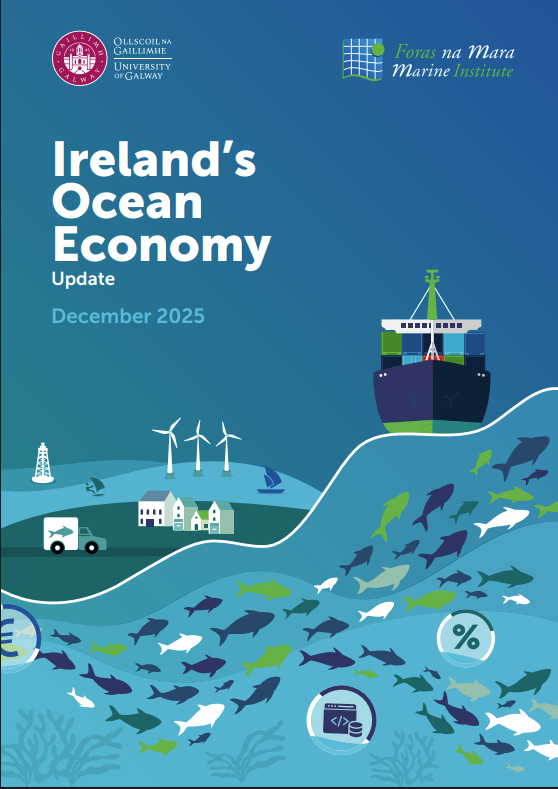
SEMRU reseracher takes part in Ryan Institute Workshop “From Soil to Society”
Dr. Luis Garcia-Covarrubias, a SEMRU postdoctoral researcher working on the MPA-Life project, participated in a workshop on Friday, December 12, at the Michael D. Higgins Auditorium, University of Galway. He was a panel memeber along side Dr. Eve Daly and Dr. Sinead Waters. The panel was moderated by Prof. Becky Whay. The panel discussed how the Ryan Institute and the University of Galway are very well positioned to deliver impactful research, grounded in: 1) a strong inter- and multidisciplinary approach, 2) building trust with policymakers and stakeholders by speaking their “language,” supported by a solid institutional framework, and 3) an outward-looking research culture.
Special thanks to Prof. Frances Fahy for the invitation to participate in the panel, and to Prof. Charles Spillane for his insightful talk and the engaging discussion during his session.
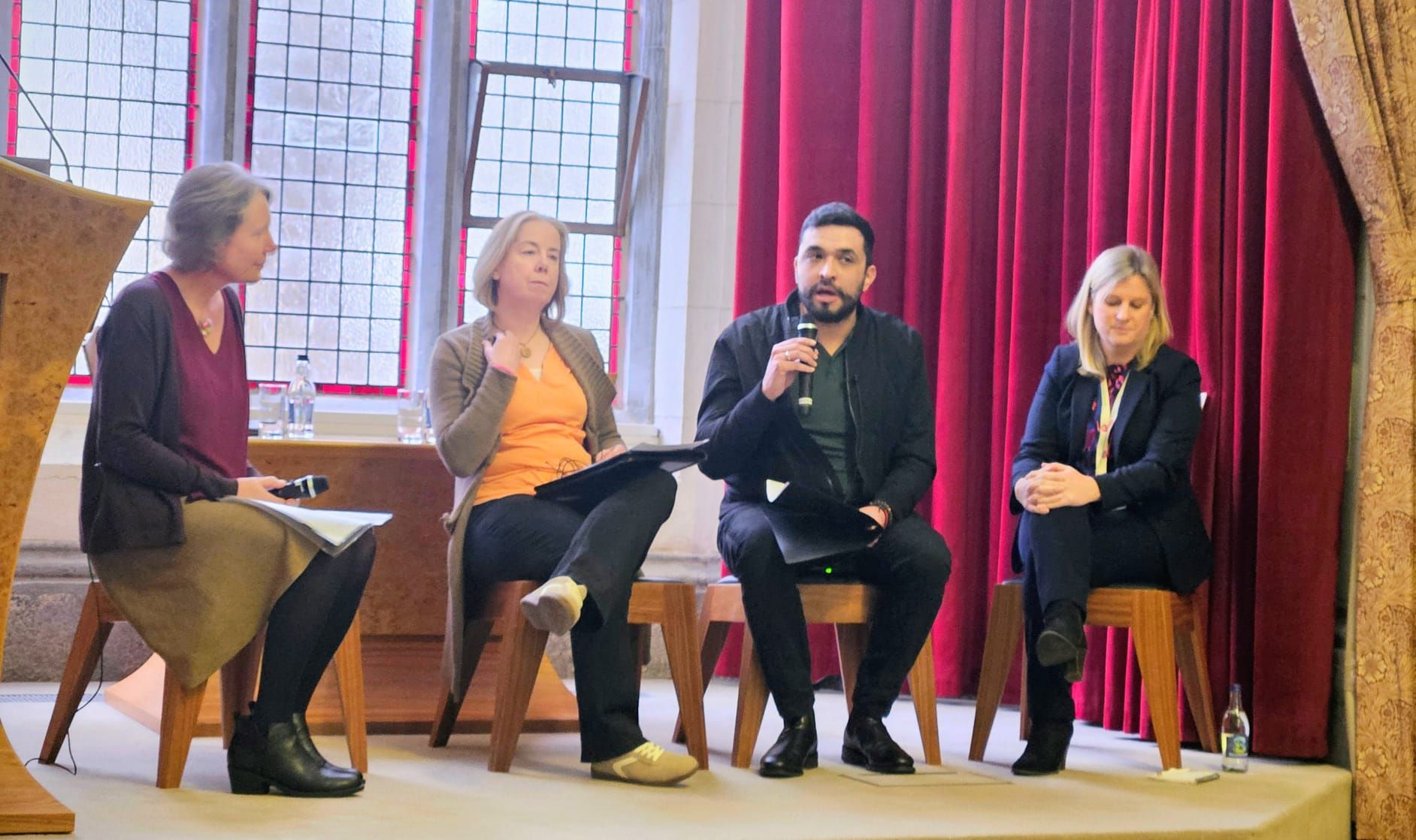 Panel memebers and moderator
Panel memebers and moderator
SEMRU at Irish UNESCO Global Geoparks Annual Public Forum
The Irish UNESCO Global Geoparks Annual Public Forum 2025 took place on November 26-27, 2025, at Hotel Doolin in County Clare. Hosted by the Burren and Cliffs of Moher UNESCO Global Geopark, the event's theme was "Natural Capital Unpackaged – How UNESCO Global Geoparks Can Play a Role". The forum featured experts presenting ongoing natural capital research in the context of Irish Geoparks, panel discussions on natural capital accounting, and a field excursion to local sites. On the first day of the forum SEMRU’s Professor Stephen Hynes gave an overview of the research taking place in Ireland on marine natural capital accounting. He also took part in a panel discussion on the appropriateness of natural capital accounting methods and policy from an Irish Geoparks perspective with Matthew Hornsby from the Department of Climate, Energy & the Environment and Dr. Catherine Farrell from Trinity College Dublin.
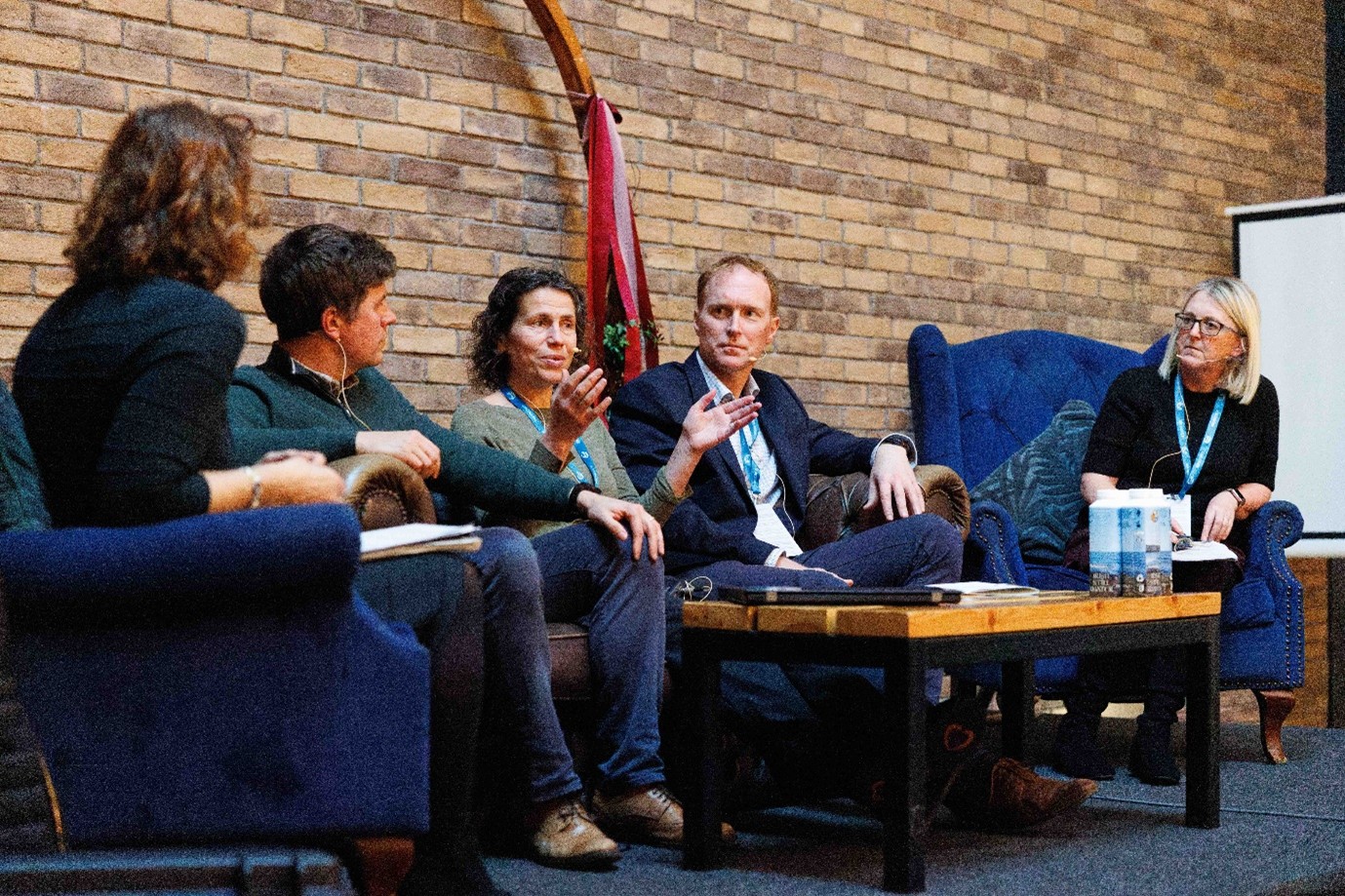
Panel discussion participants (on couch) Matthew Hornsby, Department of Climate, Energy & the Environment, Dr. Catherine Farrell from Trinity College Dublin and Prof Stephen Hynes, SEMRU with panel chairs Dr Clare Glanville, Geological Survey Ireland and Carol Gleeson, Clare County Council
15th Annual Marine Economics and Policy Research Symposium
SEMRU’s 15th Annual Marine Economics and Policy Research Symposium was held at the Institute for Lifecourse and Society (ILAS), University of Galway on the 24th of November 2025. This year the symposium concentrated on building economic modelling capacity for Ireland's marine sector. Key questions on the day were what modelling capabilities do we currently have at our disposal and how can we plan for future sectoral challenges? The symposium concluded with a panel discussion on economic modelling for Ireland's marine future.
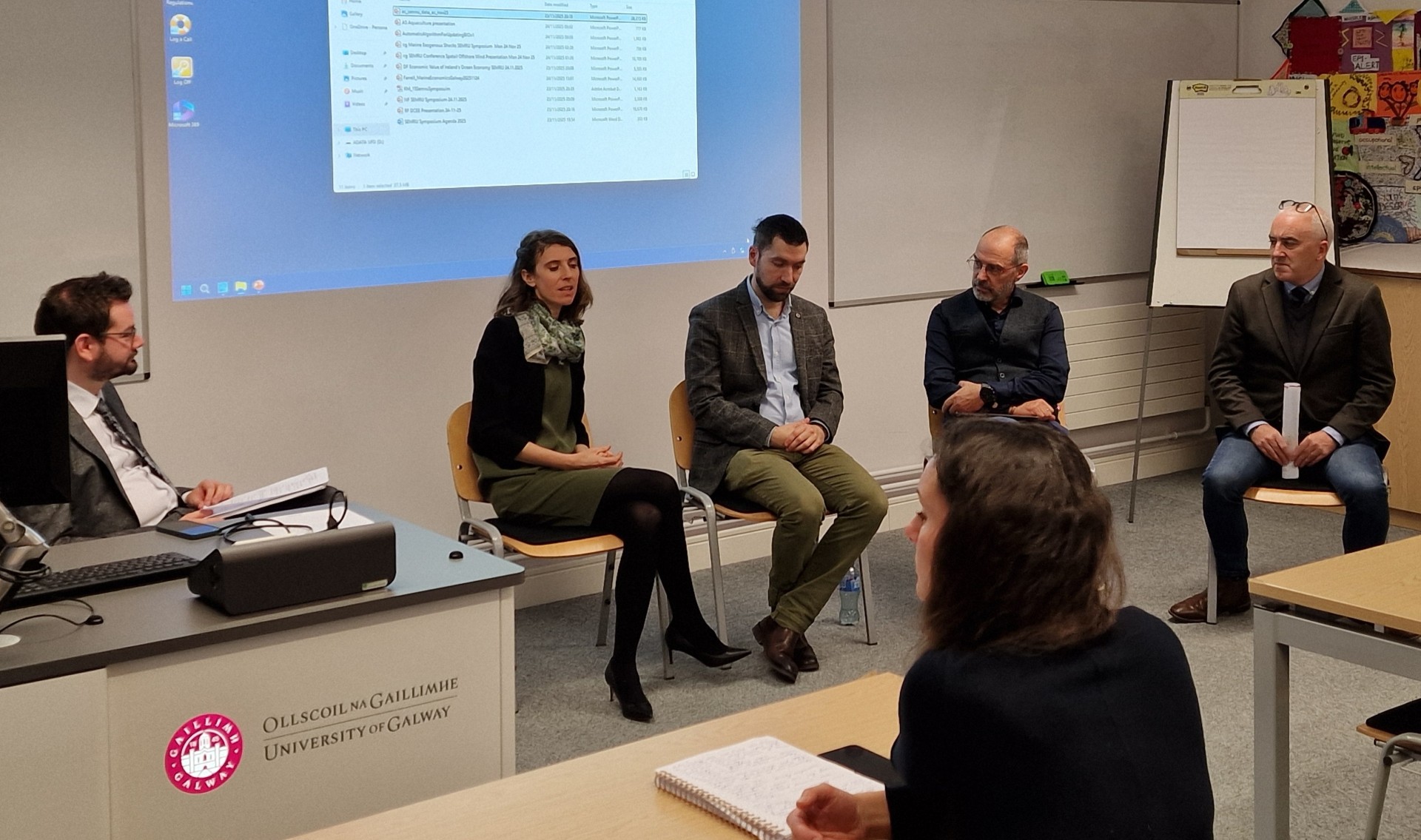 SEMRU’s Dr Cathal Geoghegan (on left) chaired the panel discussion. The panellists were Prof Karyn Morrissey, University of Galway, Assoc Prof Niall Farrell, Economic and Social Research Institute, Dr Ciaran Kelly, Marine Institute and Prof Cathal O’Donoghue, University of Galway.
SEMRU’s Dr Cathal Geoghegan (on left) chaired the panel discussion. The panellists were Prof Karyn Morrissey, University of Galway, Assoc Prof Niall Farrell, Economic and Social Research Institute, Dr Ciaran Kelly, Marine Institute and Prof Cathal O’Donoghue, University of Galway.
SEMRU accepts EU Atlantic Award 2025 for Blue Skills and Ocean Literacy on behalf of WIN-BIG project consortium.
The 12th Atlantic Stakeholder Platform Conference (ASPC 2025) was held this year, under the Irish Presidency, in Galway on the 13th November. ASPC is an annual event co-organised by the Atlantic Steering Committee Presidency, EU DG MARE and CINEA with the support of the Atlantic Assistance Mechanism to promote the EU Atlantic Action Plan goals and objectives. Each year there are Atlantic Project Awards for the best EU funded projects under four categories. The EU WIN-BIG project was selected as a winner in the category of ‘Blue skills and Ocean Literacy’ for 2025.
WIN-BIG (Women in the Blue Economy) is a European Union-funded initiative that aims to advance gender equality in the EU's blue economy. It works to increase knowledge about women's roles in the industry, identify skills gaps, and develop tailored programs and networking opportunities to support women entering and progressing in careers within maritime sectors like bioeconomy, sports, tourism, and marine energy. Led by the University of Aveiro, the WIN BIG consortium is made up of 14 partners from 9 countries covering all 6 European Sea Basins. The Irish partners involved are SEMRU at the University of Galway and the Marine Institute. Hasmik Grigoryan, Edel Doherty and Stephen Hynes, are the SEMRU team members on the project.
Dr. Grigoryan, the WIN-BIG post-doctoral researcher based in SEMRU, at the J.E. Cairnes Business School, accepted the award on behalf of the project partners on the day and also took part in a panel discussion at the conference where the essential role of diversity, education, training, and community engagement in building resilient coastal societies across the Atlantic Sea basin was discussed.
In his opening address to the conference, Timmy Dooley TD, Minister of State at the Department of Agriculture, Food, Fisheries and the Marine with special responsibility for Fisheries and at the Department of Climate, Environment and Energy with special responsibility for the Marine, took the time to acknowledge the work of the Irish partners on the WIN-BIG project when he said “I would also like to mention, the EU-funded “WIN-BIG Project” as representatives from the Marine Institute and in the University of Galway contribute greatly to this dynamic consortium that aims to increase the participation and representation of women across the EU in ensuring a gender-balanced Blue Economy.”
For more information on the work of the WIN-BIG project visit https://winbigproject.eu/
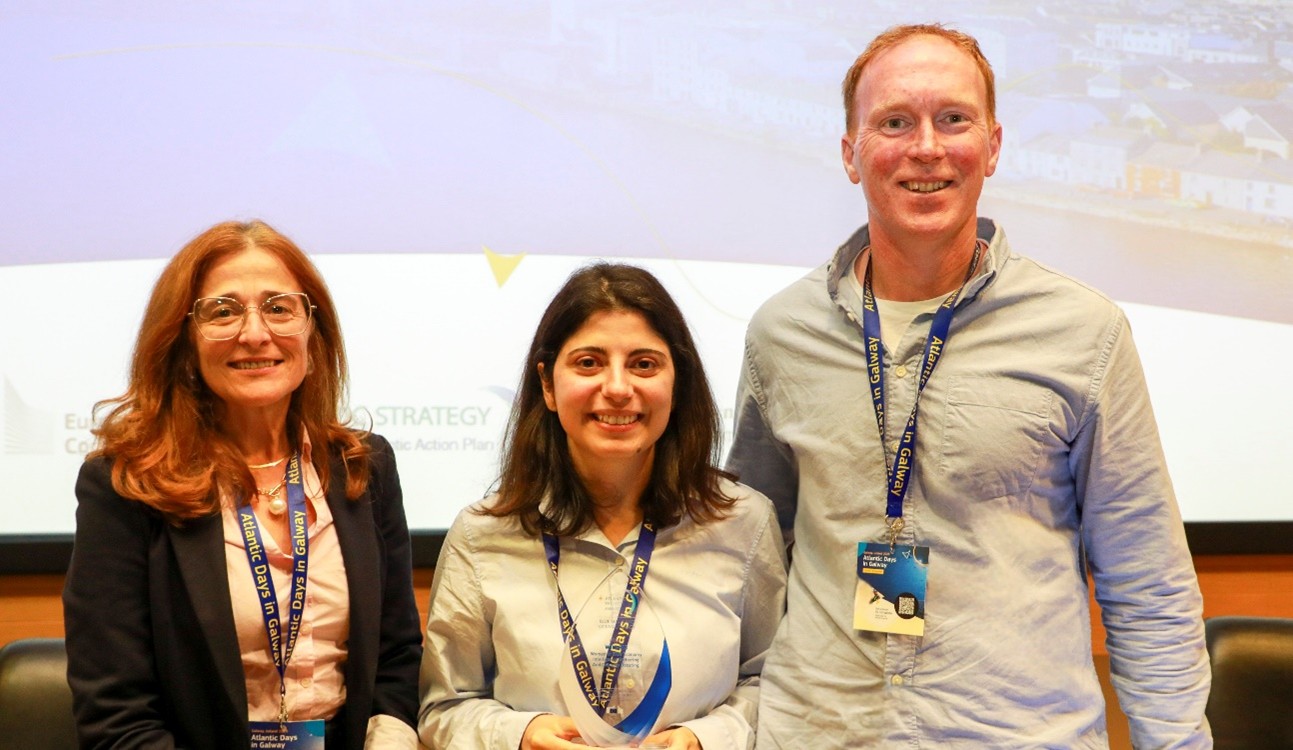
Pictured at the award ceremony are members of the WIN-BIG consortium Elisabete da Costa (BlueBio Alliance) and Hasmik Grigoryan and Stephen Hynes (SEMRU)
SEMRU participates at SER2025
Stephen Hynes and Anthony Grehan from the University of Galway both presented at the recent 11th World Conference on Ecological Restoration (SER2025) held in Denver, United States, 30th September to the 4th October. The final day spotlighted marine ecosystem restoration — with inspiring talks from top experts and the symposium “New Frontiers in Marine Ecosystems” organized by the REDRESS and CLIMAREST projects. As part of the symposium Prof Hynes from the J.E. Cairnes School of Business and Economics gave two talks; the first on “Alternative approaches to deep-sea ecosystem valuation for restoration prioritisation” and the second on “Governing Ecological Restoration in the Deep Sea”. Prof Grehan from Earth and Ocean Sciences spoke on “Restoring The European Atlantic Cold Water Coral Belt”. From coastal to deep-sea restoration, speakers shared cutting-edge insights, best practices, and new tools for scaling up marine recovery efforts across European seas.
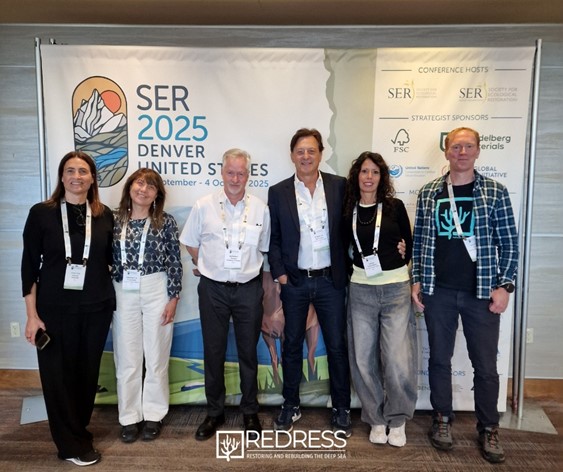
Pictured are symposium speakers (l to r) Cristina Gambi, Silvia Gallegati, Anthony Grehan, Roberto Danovaro, Cinzia Corinaldesi and Stephen Hynes
Poster Presentation at the Diversity, Economics, and Society conference
On the 4th of September 2025, WIN-BIG team members Edel Doherty (as part of the organizing committee) and Hasmik Grigoryan (as a poster presenter) attended the Diversity, Economics, and Society conference, organised by the Irish Society for Women in Economics and the Central Bank of Ireland. Hasmik gave a poster presentation titled Gender Inequalities in the EU Blue Economy. The poster presented the survey results from the EU-funded WIN BIG project. It highlighted barriers that can contribute to gender discrimination in the blue economy sectors. The conference included presentations on gender in the labour force, gender disparities, and gendered norms across various sectors, such as the banking industry, finance, and sports. It was attended by policymakers and academics and featured discussions on societal and institutional inequalities related to the promotion of gender equality and diversity.
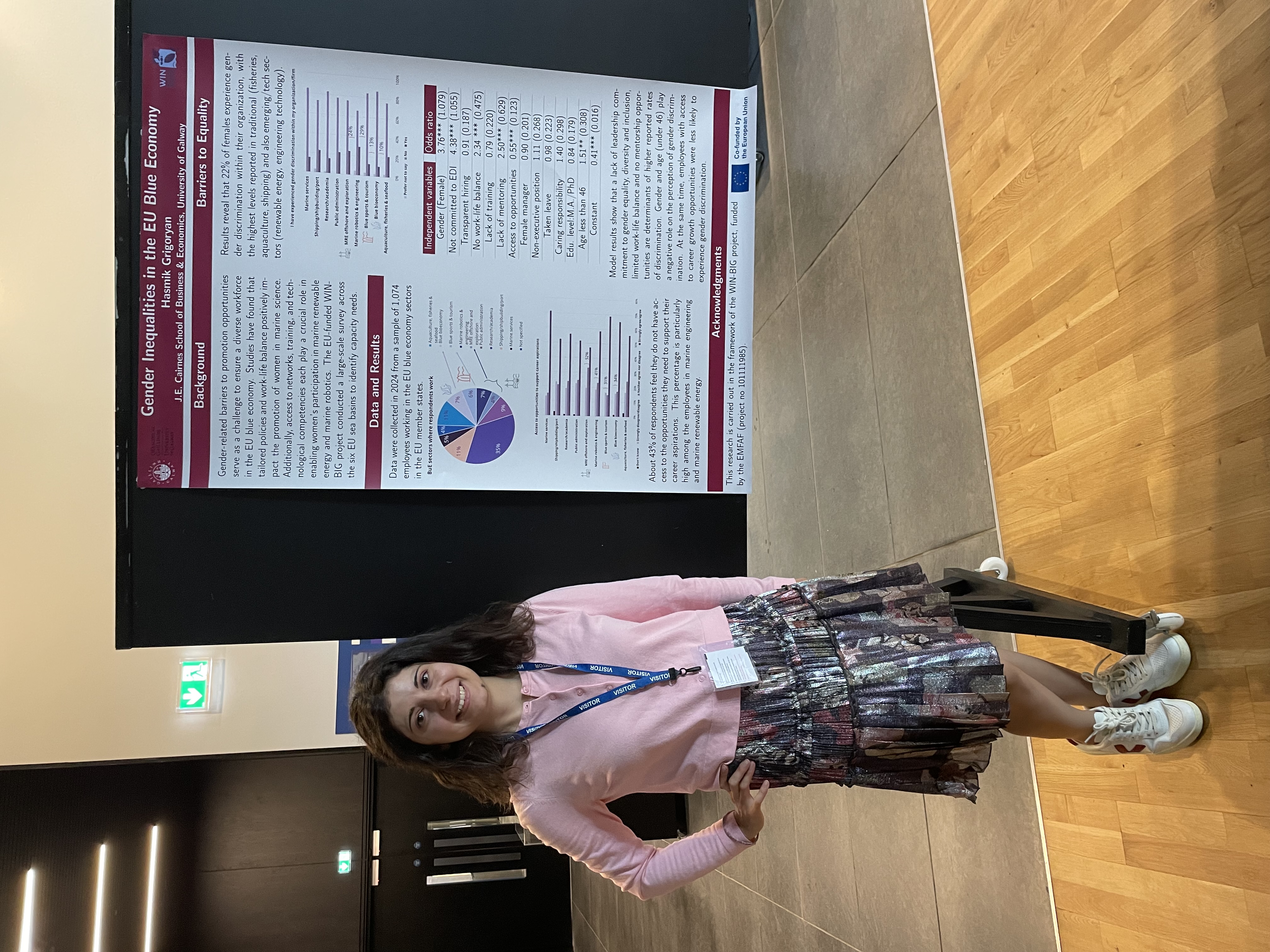 Dr Hasmik Grigoryan at Diversity, Economics, and Society conference in the Central Bank of Ireland
Dr Hasmik Grigoryan at Diversity, Economics, and Society conference in the Central Bank of Ireland
Ocean economy research in China and Ireland discussed at summer workshop
On the 27th and 28th of August delegates from the National Marine Data and Information Service (NMDIS) of the State Oceanic Administration of China visited the Socio-Economic Marine Research Unit (SEMRU) at the J.E. Cairnes School of Business and Economics. Respective marine ocean economy accounting procedures were the main topic of conversation with a particular focus on the measurement of marine and coastal tourism and the production of supply and use tables. Dr Weiling Song presented the marine economy accounting framework used in China while Ms Jingli Zhao provided a review of the marine economic assessment products of the NMDIS. Avenues for future marine socio-economic research collaboration between SEMRU and the NMDIS were also discussed. SEMRU partners from the Irish Marine Institute also joined the discussions.
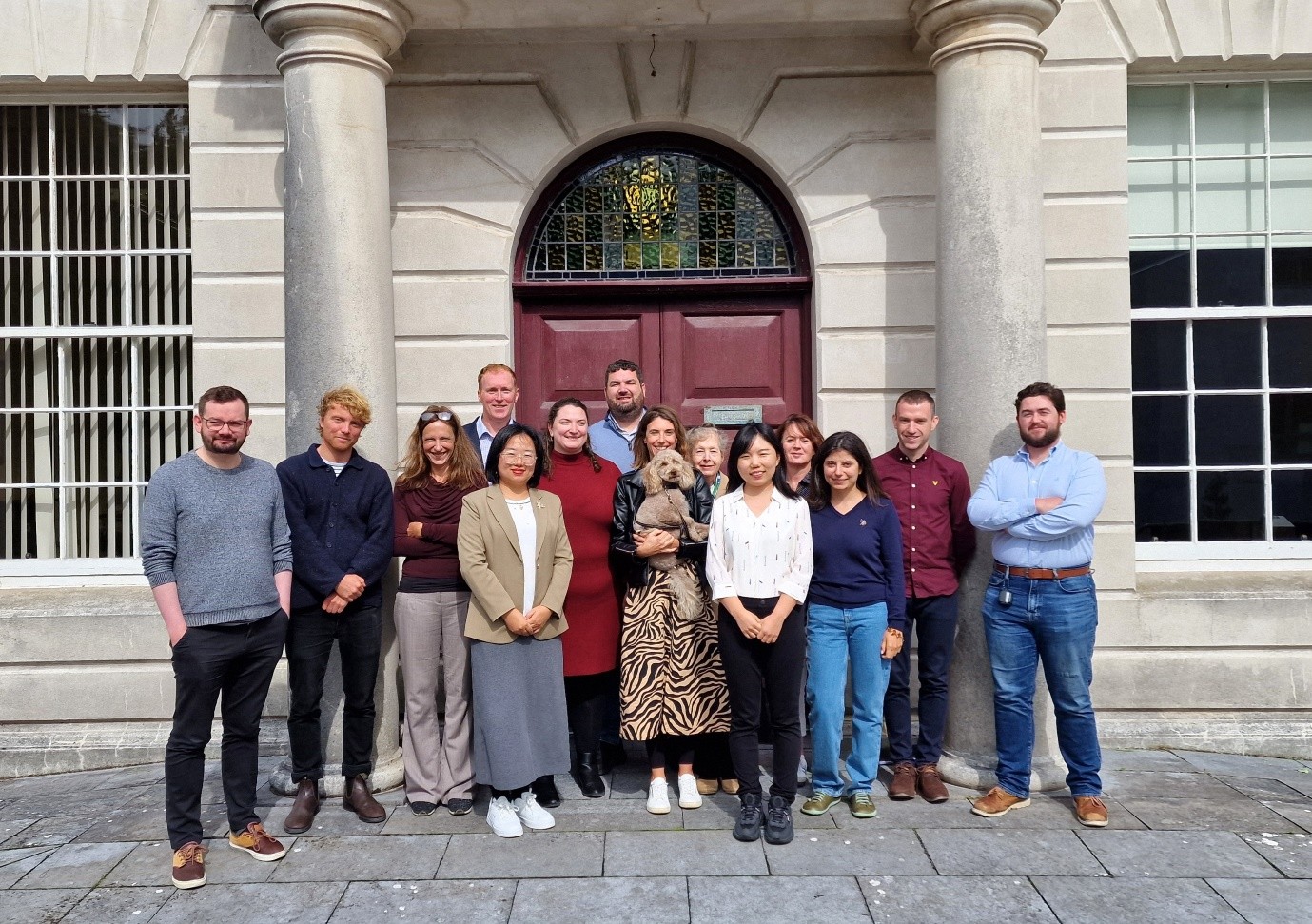 A photo of participants in the workshop
A photo of participants in the workshop
MPA-LIFE-IRELAND project on show at EMD2025
The work of the MPA-LIFE-IRELAND project was showcased at the European Maritime Day (EMD20205) in Cork on the 23rd of June 2025. The MPA-LIFE-IRELAND project had its own a stand at the main event in the Cork City Hall Exhibition area. The stand provided an excellent opportunity to bring the project to a wider policy and maritime audience. Project officers from the European Commission were there to view the work and they also accompanied the project team, on the Friday evening, on a field trip to Garretstown near the Old Head of Kinsale, to see firsthand the ongoing research aimed at protecting the critically endangered Flapper Skate. University of Galway team members Prof Louise Allcock and Prof Stephen Hynes outlined to Commission staff the ecological and economic aspects of the project hat they lead on, respectively.
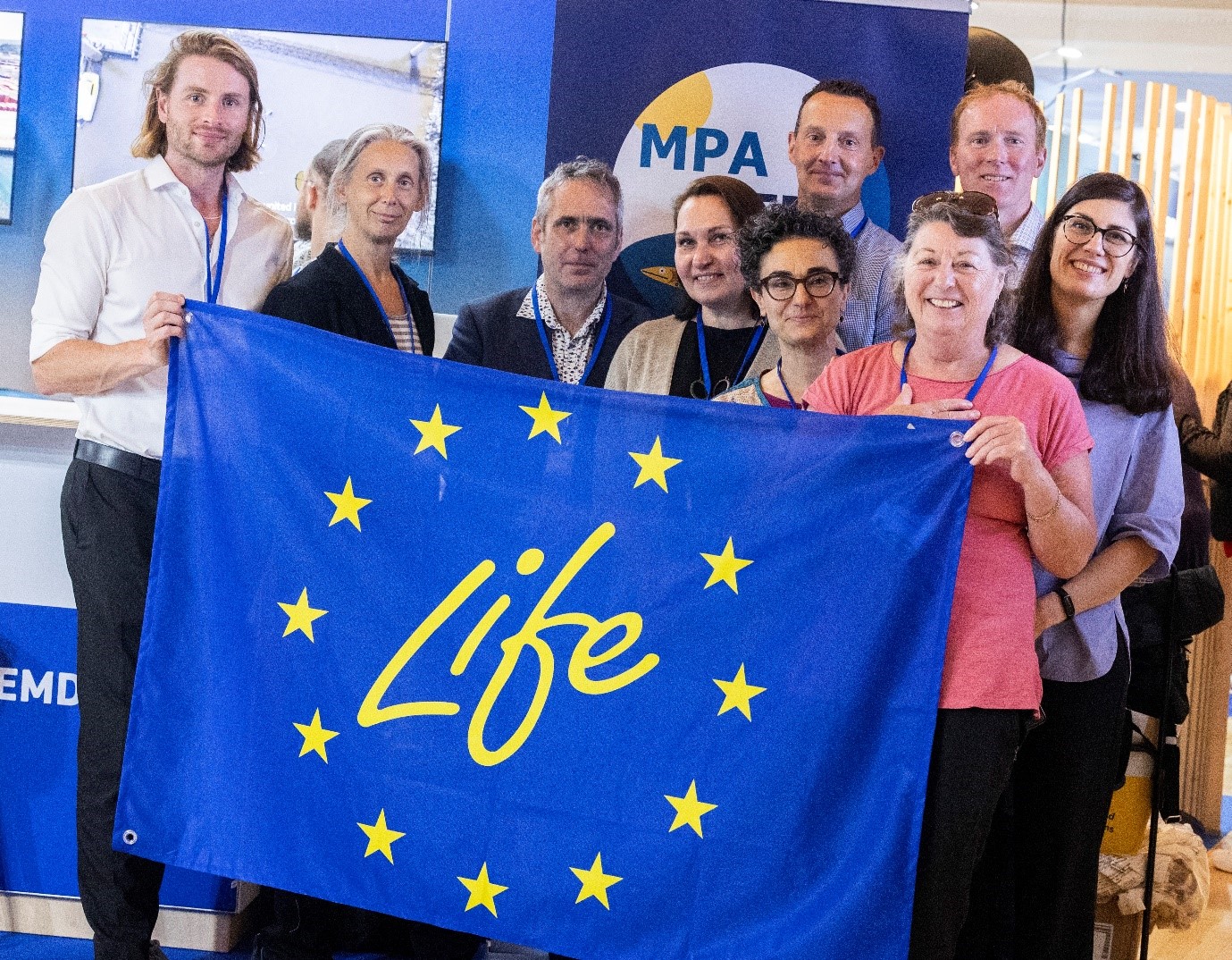
Pictured at the MPA-LIFE-IRELAND project stand at EMD20205 are (L-R) David Whyte, University College Cork, Louise Allcock, University of Galway, Tim O’Higgins, Department of Housing, Local Government and Heritage (DHLGH), Aneta Willems, Head of Department for Natural Resources, Climate, Sustainable Blue Economy and Clean Energy at CINEA, Valeria Mazzagatti Communication Adviser at CINEA, Oliver Ó Cadhla, DHLGH, Lynne Barratt, LIFE Technical Monitor at ELMEN EEIG, Stephen Hynes, SEMRU, University of Galway and Giulia Carboni, Programme Coordination Manager for Sustainable Blue Economy at CINEA. CINEA is The European Union Commission Climate, Infrastructure and Environment Executive Agency.
Presentation of WIN-BIG survey results at the European Maritime Day 2025
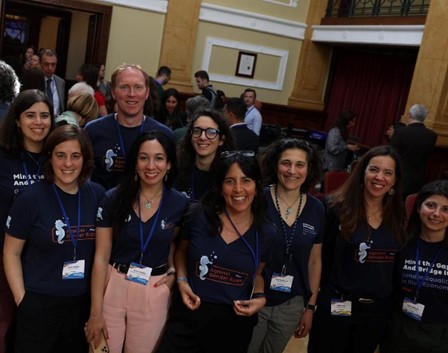
The SEMRU team of Hasmik Grigoryan, Edel Doherty and Stephen Hynes participated in the European Maritime Day (EMD) that was held in Cork, Ireland from 21st to 23rd of May, 2025. The EU funded WIN-BIG project, where University of Galway is the lead for work package 2 “Mapping and intelligence gathering”, took an active role in the EMD 2025 and organized a workshop titled “Blue economy women champions take the stage at EMD2025”. The workshop comprised of two sessions. In the 1st session, the project lead and coordinator Prof Helena Vieira (University of Aveiro) and Dr Hasmik Grigoryan (University of Galway) presented the preliminary results from the WIN-BIG survey, covering topics related to the survey sample, gender discrimination and the access to the opportunities for career growth. This was followed by presentations from the blue economy female champions and role models on their career and success stories.
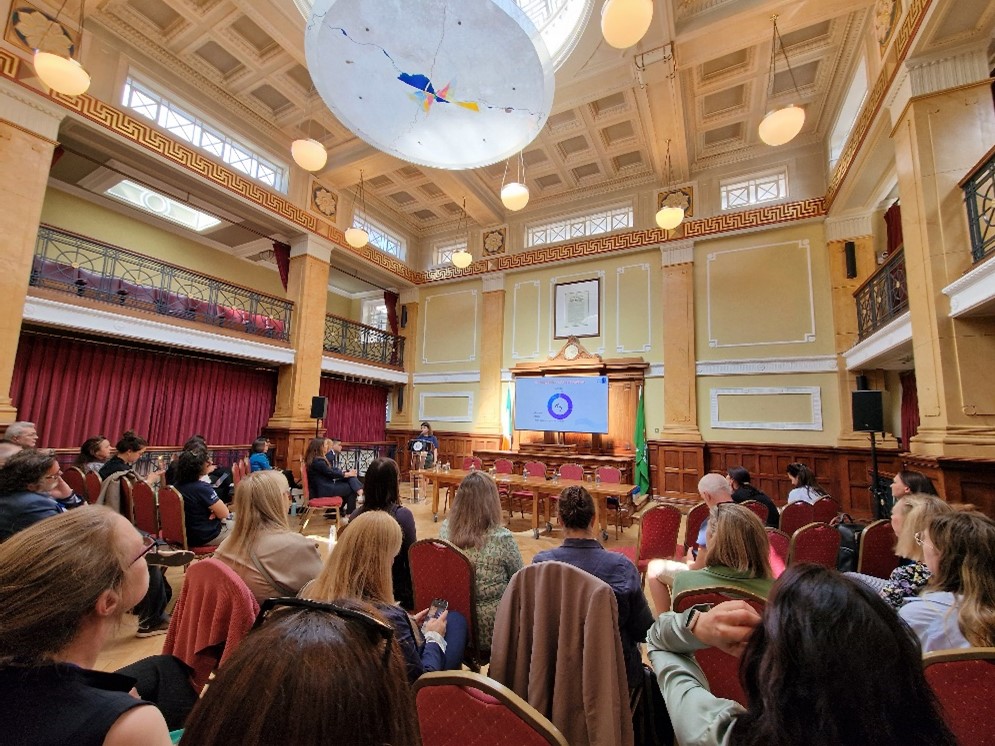
Third annual meeting of the EU-funded WIN-BIG on women in the EU blue economy
The third annual meeting of the EU WIN-BIG project took place in Cork, Ireland on the 20th of May, 2025. The main goal of the project is to gather data on gender status in the EU blue economy across all the EU sea basins, to identify skill gaps preventing women from entering or progressing the career ladder, and to develop learning labs, programs and networking events. The meeting was attended by the project consortium members, members of the Advisory Board, and the EU CINEA Project Officer. The WIN-BIG coordinator Helena Vieira from University of Aveiro gave a general overview about the project and its results. This was followed by presentations of each project work package implemented by the individual partner organizations. The SEMRU team –Stephen Hynes, Edel Doherty and Hasmik Grigoryan – participated in the meeting and presented the progress and the ongoing work for their responsible work package 2 “Mapping and intelligence gathering”.
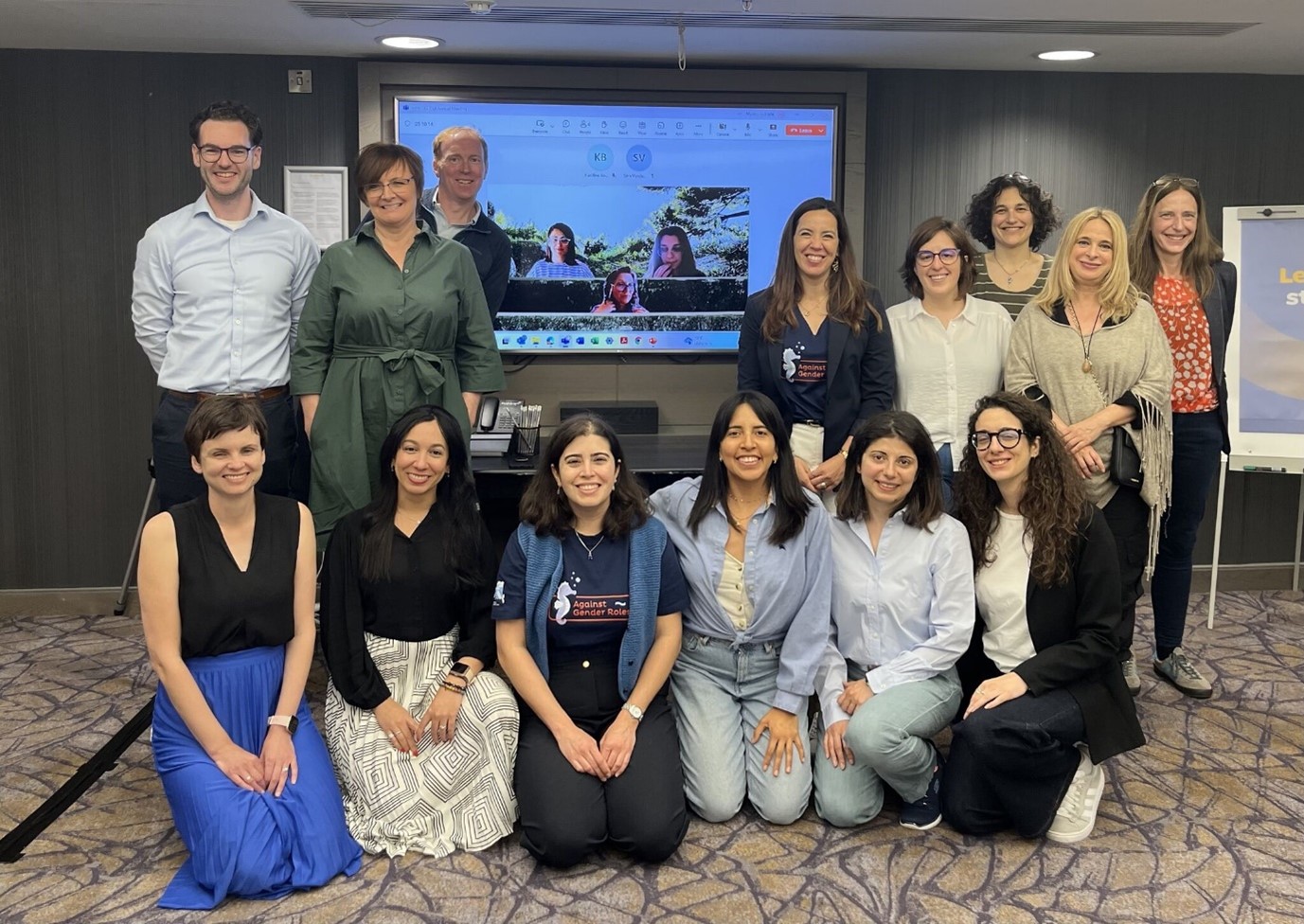
SEMRU participate in new EU LIFE Award
The EU LIFEMAPPER project has officially started on the 1st of May 2025 and will be working across Europe to map, protect, and restore our vital marine ecosystems. Restoring the sea requires the right tools. The LIFEMAPPER project will produce guidance on selecting effective restoration measures, estimating costs, and identifying knowledge gaps. Because vast areas of EU seas remain unmapped or poorly understood the project will develop clear, science-based guidelines to fill these critical knowledge gaps. LIFEMAPPER will assess marine habitat condition, quality, and connectivity. The project aims to support EU Member States in achieving the targets of the Nature Restoration Law. The €1.3 million project brings together seven European research partners, including the University of Galway and is led by the Italian National Research Council (Consiglio Nazionale delle Ricerche, CNR). The Socio-Economic Marine Research Unit, within the J.E. Cairnes School of Business and Economics is responsible for the delivery of work package 5 ‘Assessing restoration costs’. The team, led by Prof Stephen Hynes, will develop methodologies for cost estimation and the prioritisation of restoration efforts based on cost effectiveness criteria, and provide guidance on how best to embed cost-effectiveness analysis for marine ecosystem restoration into relevant policy frameworks.
LIFEMAPPER is funded by the EU Commission through the EU LIFE Programme.
LIFEMAPPER - “Guidelines for MAPping, ProtEcting, and Restoring Marine Ecosystems”
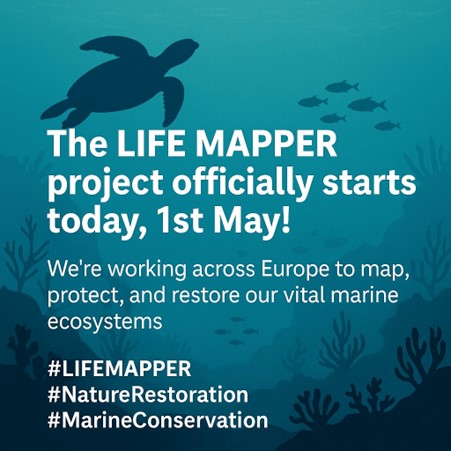
SEMRU attend REDRESS First Annual Meeting
The EU REDRESS project’s first annual meeting was held in Heraklion, Crete from 3rd to 4th March 2025. The main aim of the project is to contribute to the EU commitments towards restoring degraded deep-sea ecosystems. The meeting saw the participation of a large audience including members of the Consortium, members of the Advisory Board, and members of the EU Directorate-General for Research & Innovation and the EU Directorate-General for Environment, including the EU Project Officer. The REDRESS coordinator, Prof Roberto Danovaro (UNIVPM), opened the meeting giving a general overview of the results achieved in this first year of the project for all the work packages (WPs). After this overview of the first 12 months of the project for each WPs, the meeting continued with presentations of the WPs co-leaders and task leaders. Prof Stephen Hynes and Dr Daniel Norton of SEMRU, who co-lead WP4 – “Enabling deep-sea ecosystem restoration: socio-economic costs, benefits, and financing” presented updates on the progress of the WPs activities and the plan for the coming year.
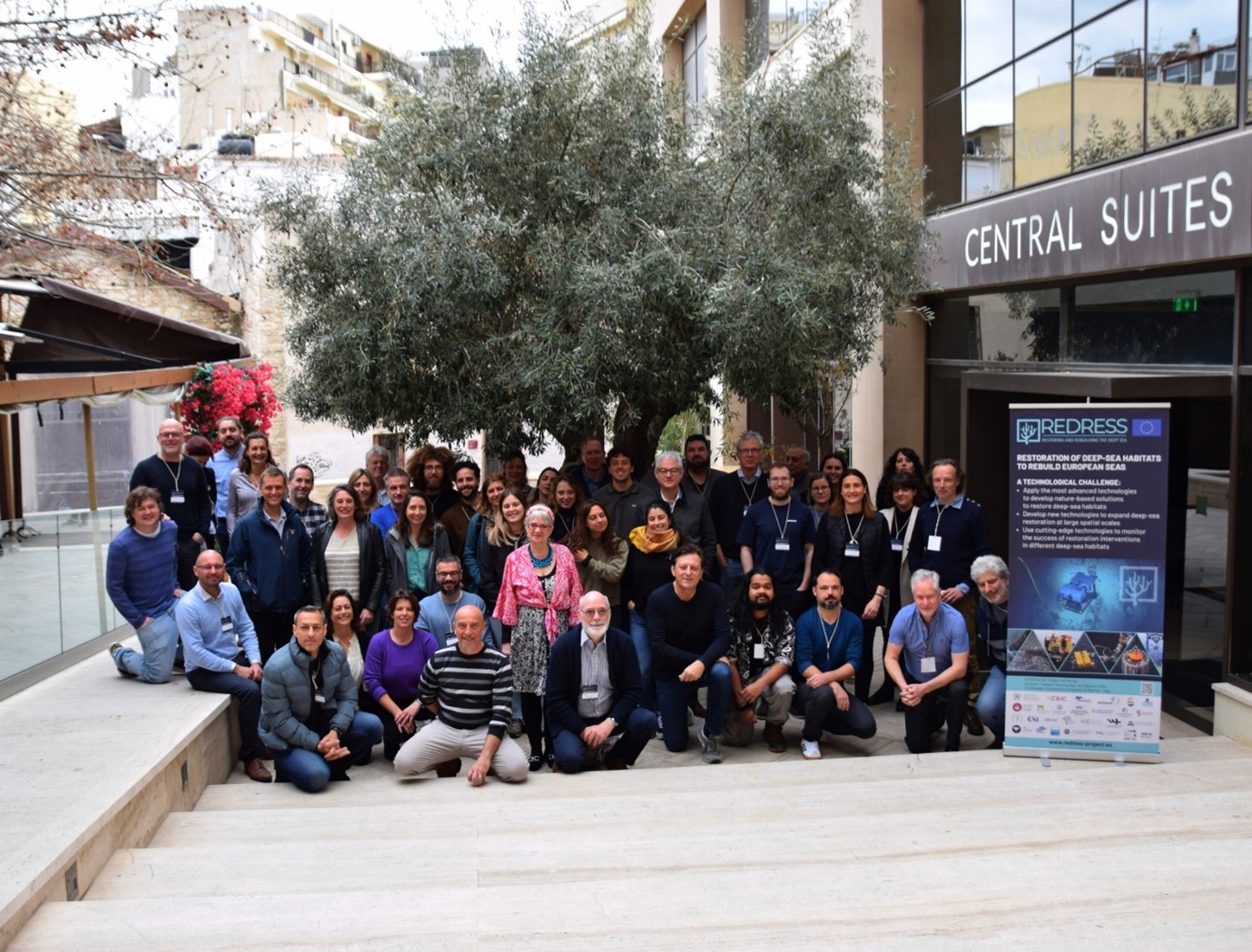
Economics Students at Sea!
The M. Global Environmental Economics students recently took part in the seagoing training that has been part of the Masters programme for over a decade. The field trip took place on Thursday the 27st of February. Students and instructors are pictured below disembarking the national research vessel, the RV Tom Crean. The training focuses specifically on economic activities taking place in Cork Harbour and a hands-on examination of the methods by which marine scientists collect data that can be used by economists for bio-economic modelling, analysing the impacts of economic activities on the marine environment and valuation of marine ecosystem service benefits.
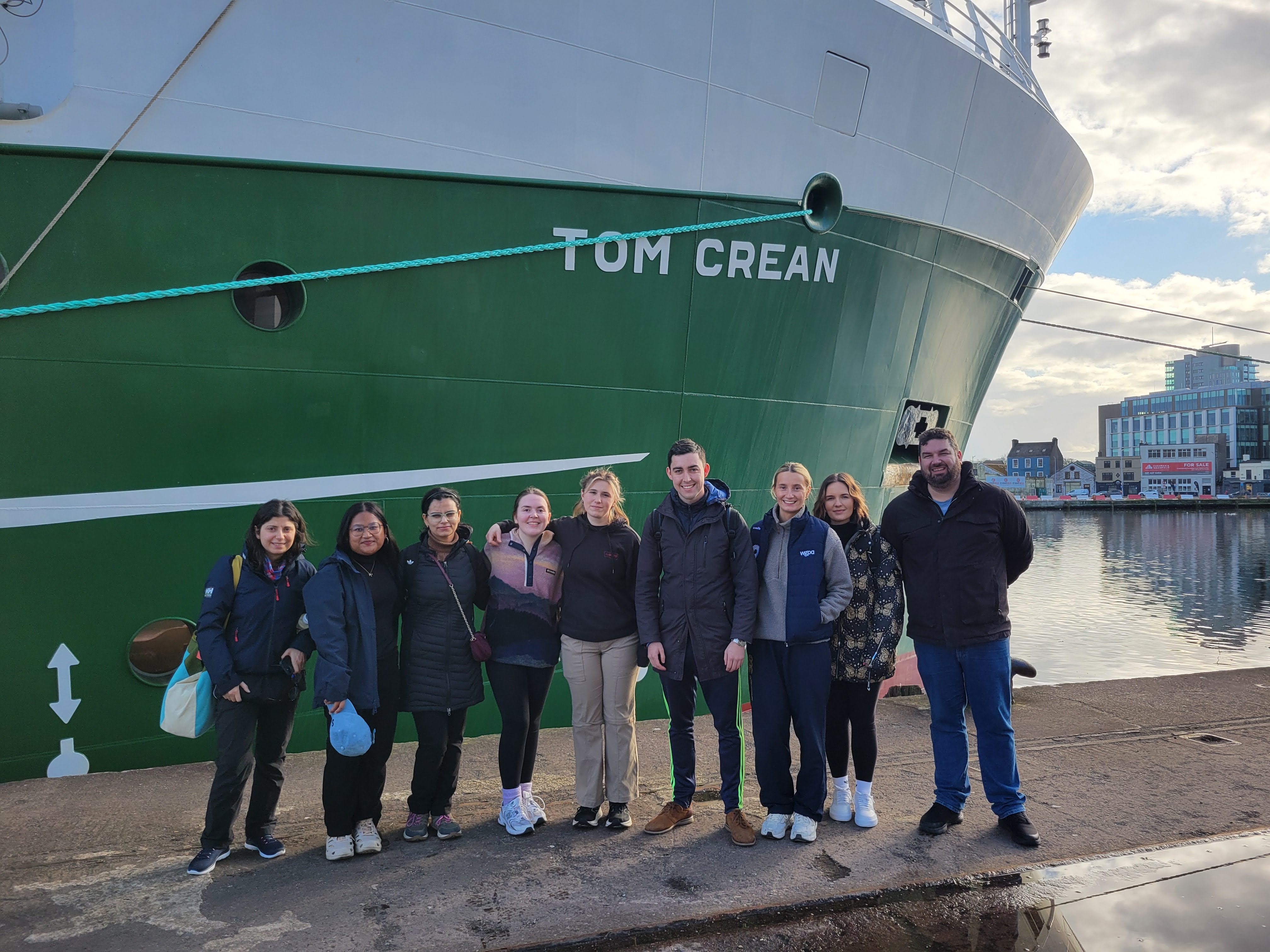
SEMRU to partner on new EU LIFE project.
The LIFE-MAPPER project seeks to consolidate current knowledge and best practices in marine habitat mapping and restoration. Recent research highlights that vast areas of EU marine habitats remain unmapped, with existing maps often lacking detailed biological data on species and communities. To address this, comprehensive guidelines are needed to systematize habitat information across EU marine regions and align efforts with directives like the Marine Strategy Framework Directive, the Habitats Directive, and the EU Biodiversity Strategy 2030. The LIFE-MAPPER project aims to develop guidelines for mapping marine habitats, selecting suitable restoration technologies, and conducting a cost/benefit analysis of mapping benthic habitat types. The project will recommend a framework for prioritizing conservation and restoration actions to maximize ecological benefits and optimize resource allocation. By working with EU Member States, the European Commission, and relevant agencies, LIFE-MAPPER will help advance the implementation of environmental directives, ensuring effective marine conservation and restoration across Europe. SEMRU will partner with six other research organisations from across Europe on the project and will be responsible for work package four that aims to understand the full suite of costs involved in marine restoration activities aimed at achieving the targets under the EU Nature Restoration Law. The National Research Council of Italy are the lead partner on the project. The project is due to start in July 2025.
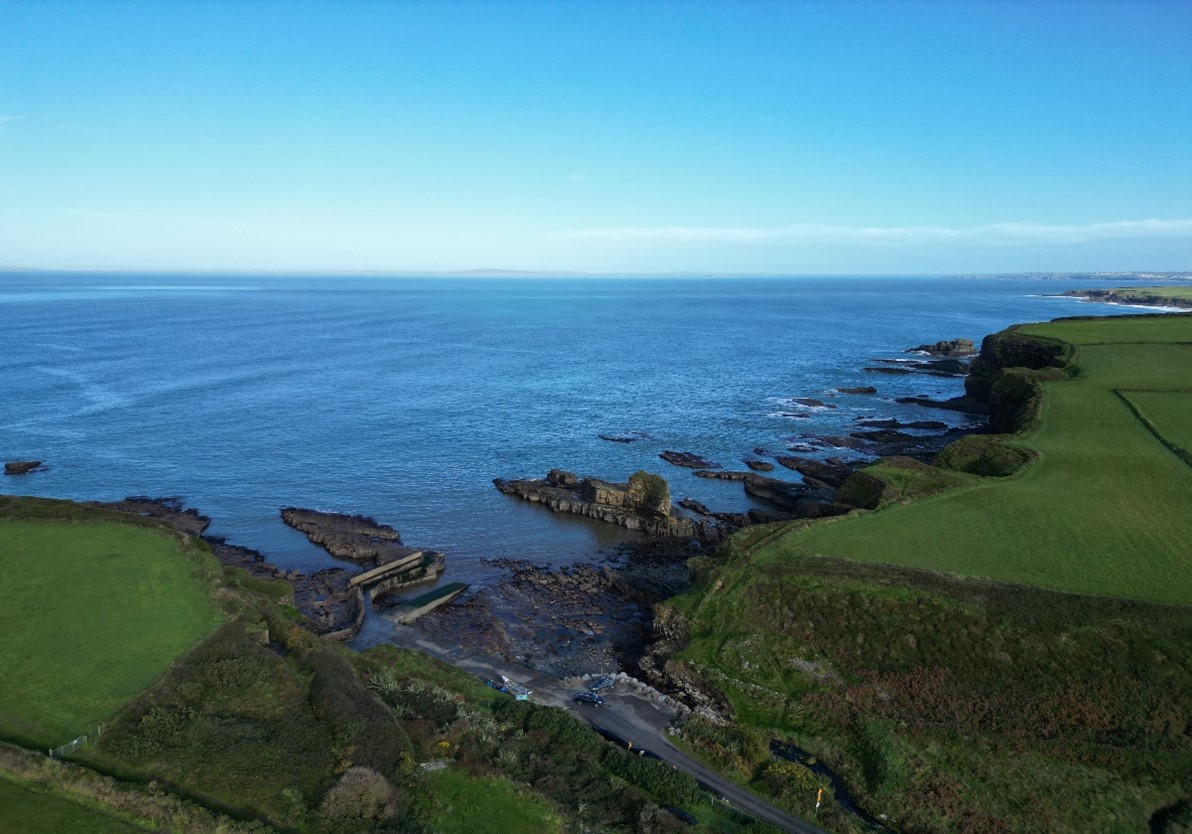
Latest ocean economy report highlights post-pandemic recovery across the sector
SEMRU, in partnership with the Marine Institute, has published the latest report on the performance of Ireland’s ocean economy, providing a comprehensive analysis of the sector's economic contributions and trends.
The report reveals that Ireland’s ocean economy achieved a turnover of €6.5 billion in 2023, contributing €2.7 billion in Gross Value Added (GVA) and supporting approximately 39,000 jobs. Over the five-year period from 2019 (pre-COVID) to 2023, turnover increased by 20%, GVA rose by 31%, and employment grew by 8%, demonstrating the resilience and steady expansion of the country’s marine industries.
While the overall turnover and GVA showed moderate declines between 2022 and 2023, eight out of 13 marine sectors experienced growth, reflecting a robust post-pandemic recovery. Sectors such as Shipping, Sea Fisheries, Aquaculture, Seafood Processing, and the Gas industry faced specific challenges contributing to declines, but the broader trends point to a period of adaptation and innovation.
Welcoming the report, Dr Rick Officer, CEO of the Marine Institute, stated: “I am delighted that the Marine Institute, in partnership with the University of Galway, has published Ireland’s 2024 Ocean Economy Report. This report not only highlights the impressive economic contributions of Ireland’s marine industries but also underscores their strategic importance in shaping a sustainable future for our country. Capturing detailed insights and trends including measuring the economic value of our marine industries is an important element of our work in supporting Government with the best available evidence to inform policy. This collaboration, supported by the Central Statistics Office (CSO) and Bord Iascaigh Mhara (BIM), provides a robust analytical framework to inform marine and maritime planning and deliver equitable and sustainable ocean and coastal economies.”
Commenting on the findings, Professor Stephen Hynes, Director of SEMRU at the University of Galway, said: “It is clear from the data and trends that there is a continuing post-pandemic recovery across most sectors. This remains a period of transition for Ireland’s ocean economy as marine industries innovate and respond to new policies and opportunities aimed at addressing the climate and biodiversity crises.”
The full report, Ireland’s Ocean Economy, 2024, is now available to download at http://hdl.handle.net/10793/1999.
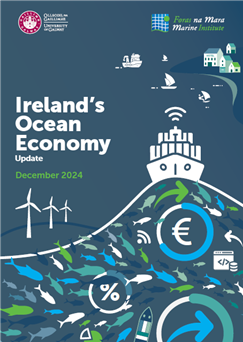
WIN-BIG project presents results about gender inequalities in the blue economy
WIN-BIG project member Dr. Hasmik Grigoryan presented results from her work at the Economics discipline seminar (J.E. Cairnes School of Business & Economics) on January 23.
The research results, carried out in the framework of the EU-funded WIN-BIG project, focused on the findings from a systematic literature review about gender discrimination in the EU blue economy sectors. Various gender inequalities, such as invisible status of females, occupational segregation, lack of capital and training opportunities, lack of efficient policies and safety issues were discussed during the seminar. It was highlighted that women in the blue economy sectors related to marine robotics and research lack training and funding opportunities. While, in the marine based sectors such as maritime transport and offshore occupations females may face safety issues. The research findings emphasized that data collection, policy and institutional changes are required to decrease the existing gender inequalities and improve the attractiveness of the sectors.
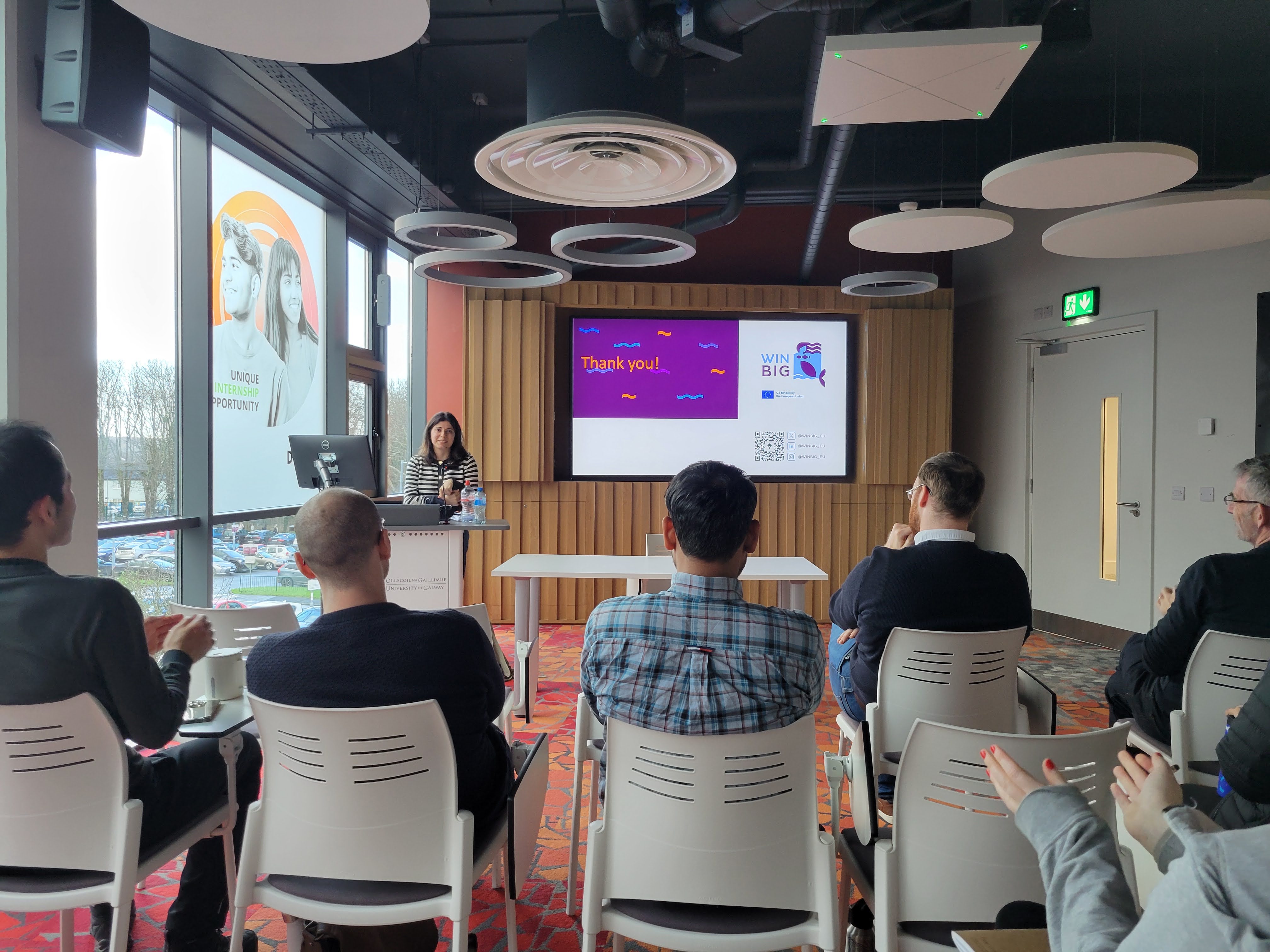
MASTS project visits the Central Bank for Nollaig na mBan event.
The Central Bank of Ireland held their annual Nollaig na mBan event this January 9th in Dublin. As a part of the event the MASTS Project’s Dr. Julian Worley attended was able to showcase the progress made on the project so far. She was a part of a cohort of early career women researchers in Economics who were invited to present posters detailing their current work. It was a great event and provided opportunities for networking amongst colleagues in different economic subfields.
